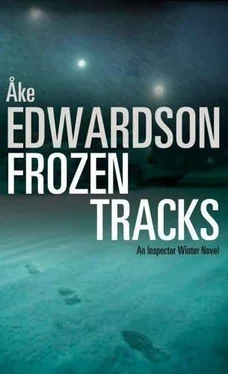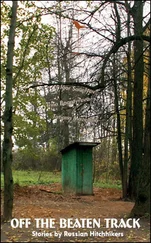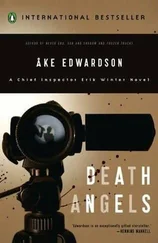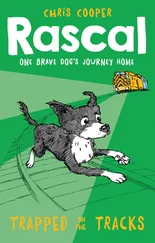He would have to help them.
He got out of the car and left his things behind, but he didn’t lock the doors.
He’d positioned the car so that it was pointing toward the road back to the park, and he walked past the square and he found himself behind the high-rise buildings after only one or two minutes, and he could feel the sweat again and he suddenly felt sick, his head was spinning. He paused and breathed deeply, and that felt better. He walked a few more paces and somebody said something.
He looked down at the boy, who was standing beside a bush.
“What’s your name?” asked the boy.
HE LOOKED AT HIS HANDS ON THE STEERING WHEEL. THEY WERE shaking. He had to keep moving them to new positions, to make sure his driving wasn’t affected. He didn’t want that to happen.
All the parking places were taken, which was unusual. He drove around the block, and when he returned there was an empty space.
He drank a glass of water in the kitchen before taking off his shoes. He’d never done that before. He always left his shoes in the hall, so as not to bring grime and dirt into the apartment, as had happened now. He’d cleaned the apartment yesterday, and wanted it to be nice and tidy for as long as possible.
He put down his glass and looked at his hand, and at what was in his palm, and he turned his head away again and walked all the way through the kitchen and the hall to the bathroom, where he washed his hands with his face averted. He couldn’t see properly what he was doing, so water splashed down onto the floor, but that couldn’t be helped.
He dried his hands. The telephone rang. He dropped the towel. The phone was still ringing. He went into the hall.
“Hell… hello?”
“Is that Jerner? Mats Jerner?”
“Er, yes.”
“Hello, this is Gothenburg Tramways, Järnström here. I’m calling in connection with that accident at Järntorget. I’m handling the inquiry.”
Järnström and Järntorget, he thought. Did they select inquiry chairmen on the basis of their name? Or of the victim. My name fits in as well.
“It’s almost finished, in fact,” Järnström went on.
“Have we met?”
“No.”
He heard the rustling of paper.
“We’re basically done,” said Järnström, “with all this. You can start again.”
“Start work again, do you mean?”
“Yes.”
“So there’ll be no more interrogations?”
“Interrogations?”
“Questions about how I do my job.”
“That’s not what-”
“So it’s not my, er, not my fault anymore?”
“Nobody ever said it was. You were-”
“I was suspended.”
“I wouldn’t call it that.”
“What would you call it then?”
“It’s just that we had to hold this inquiry and it’s taken a bit of time.”
“Whose fault was it, then?”
“I beg your pardon?”
“
Whose fault was it, then?” he yelled into the telephone. The man was evidently a bit deaf and he had to speak more loudly. “Who’s going to take responsibility for everything that’s happened?”
“Calm down now, Jerner.”
“I am calm.”
“It’s all over and done with now,” said Järnström. “As far as you’re concerned.”
“Who isn’t it all over for?”
“I’m don’t follow.”
“Is it the drunk it’s not all over for? It was all his fault.”
“That kind of thing is a problem,” said Järnström.
“Who for?”
“For Gothenburg Tramways,” said Järnström.
“For the drivers,” he said. “It’s a problem for the drivers.”
“Yes.”
“That’s what causes this kind of thing.”
“Yes, I know.”
“Was there anything else?”
“No, not at the moment. We might need to ask you about the odd detail later on, but tha-”
“So I just need to show up for work again?”
“That’s precisely why I called you, to tell you that.”
“Thanks a lot,” he said, and hung up. His hand was starting to shake again. It was clean now, but it was shaking.
He went back to the kitchen and sat down, then stood up again immediately and went into the hall and felt in his right-hand jacket pocket and took out the souvenir he had of the boy.
He sat on the sofa and contemplated it. Then burst into tears.
It had never gone this far before. Never. He’d felt it coming on and had driven around in a big circle first in the hope of maybe being able to snap out of it, but instead he’d been sucked into the spiral, and he’d known it would end up like this.
What would happen next time?
No
no no no!
He went to get the video camera from the hall, and continued arguing with himself.
He watched the film play on the television screen.
He heard the boy’s voice asking what his name was. He heard himself replying without knowing then what he’d said. But he didn’t say the name he had now. He said the other name he’d had when he was a boy, a little boy like him, no, bigger, but still little.
The film was flickering on the screen. Cars, trees, rain outside, traffic in the street, a set of traffic lights, then another, his own hand on the steering wheel. The boy. A glimpse of his hair. No voice now, no sound at all. His hand. A glimpse of the hair again, no face, not in this film.
***
Winter tried to think in time with the music, which was in tune with the November twilight outside. Car headlights on the other side of the river were stronger than the light from the sky.
He had taken the same route that Stillman, the law student, had walked that night. Climbed up the steps and passed Forum and his own dental office and the library and stood in the middle of the square where the attack had taken place. How could it happen? How could he not have seen what was coming? Bicycle, perhaps. But that was hard to believe. Somebody creeping up from behind? Hmm. No, he didn’t think so. Somebody Stillman had arranged to meet? Who came sauntering up from behind or the side or in front? More likely. But Stillman should have noticed, for God’s sake. Should have been able to say something about it afterward.
He might have met somebody he knew.
There was also the other possibility, that he was with somebody whose identity he didn’t want to disclose. Why?
Warum? Pourquoi? Porqué?
That was always the most difficult question, no matter what language you asked it in. “Who?” and “where?” and “how?” and “when?” were the immediate questions that required immediate answers, and when those answers were found, the case was solved. But there was always that “why?” often in the form of a little prick in his memory, long afterward. Something unsolved, or undiscovered. Always assuming there was an explanation. Not everything was wrapped up, with explanations as an extra bonus.
But nevertheless. If he could get a better idea of this “why,” and soon, he’d be able to discover the answers to “who” and “where” and “how” and “when.”
There was a knock on the door and in came Ringmar. Winter remained in his desk chair, and Ringmar perched on the edge of his desk.
“It’s gloomy in here,” said Ringmar.
“Are you referring to the light?”
“What else?”
“It’s serene,” said Winter.
Ringmar eyed the Panasonic on the floor under the window, and listened for half a minute.
“Serene music,” he said.
“Yes.”
“In tune with the light.”
“Bobo Stenson Trio.
War Orphans,” said Winter.
“War victims.”
“Not really. More like kids who have lost their parents thanks to war.”
“War victims sounds better.”
“If you say so.”
Ringmar sat down on the chair in front of the desk. Winter switched on his desk lamp and the light formed a little circle between them. They had sat there many a time and slowly discussed their way forward to solving a riddle. Winter knew he wouldn’t have gotten as far as he had without Ringmar. He hoped it was the same for his older colleague. No, he knew it was. Even so, there were things he didn’t know about Bertil, of course. Large chunks of his life. The kind of things he didn’t need to know, just as Bertil didn’t need to know everything about him.
Читать дальше












